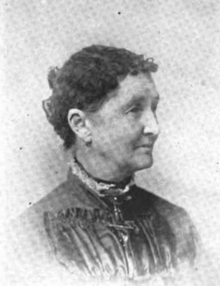Adelia Cleopatra Graves

Adelia Cleopatra Graves (née Adelia Cleopatra Spencer; pseudonym, Aunt Alice; March 17, 1821 - 1895)[1] was an American educator and author from the U.S. state of Ohio. Formerly Professor of Latin and Belles-lettres at Mary Sharp College, she went on to occupy the position of Matron and Professor of Rhetoric in the College.[2]
Early years and education
Adelia Cleopatra Spencer was born in Kingsville, Ohio, 17 March 1821. She was the daughter of Dr. Daniel M. Spencer and Marian T. Cook, and a niece of Platt Rogers Spencer, the originator of the Spencerian script. Graves' mother was an intellectual. Her family was wealthy and cultured, all the men having for generations had the benefit of collegiate education. Her father especially excelled in the Greek and Latin languages.[3]
Graves spent her early life upon the shores of Lake Erie. In her early girlhood, she resolved to devote her life to literature. The Muses had been the companions of her childhood. Stanzas written before she was nine years old were models of correct versification, exhibiting simplicity of expression and happy choice of words which characterize the productions of her more mature years. She wrote because she could not restrain the flow of thoughts, taking shape in rhymes. She loved to be alone — passing her time on the beach, or in the old forests near where she had been born. Her love of nature was a passion, the record of which is given in some of her earliest unpublished poems.[2]
Career
She married Dr. Z. C. Graves, president at that time of Kingsville Academy, and later, founder and President of Mary Sharp College, Winchester, Tennessee. For years, she taught classes in languages in the Kingsville Academy. There were few positions in the Mary Sharp College, she did not occupt at some point. For 32 years, she was matron and professor of rhetoric, belles-lettres, elocution, and English composition. She also taught French, ancient history, ancient geography, and English literature.[3] A few years after her marriage, Graves received a bad injury, which crippled her physical energies. For five years, she could not walk across her room; and later found it difficult to walk a short distance.[2]
The published works of Graves include "Seclusaval, or the Arts of Romanism" (1870), a work written to deter Protestants from sending children to Catholic schools, and "Jephtha's Daughter," a drama, (1867). Besides these, there were two prize stories. Twelve or thirteen small volumes were also compiled from the "Southern Child's Book", at the request of the Southern Baptist Sabbath School Union, for the use of Sabbath-schools. For years, Graves edited and wrote for that publication. She wrote the "Old Testament Catechism in Rhyme" (1859), on request of the same society, for African Americans slaves, for which she received US$0.20 cents a line. Her unpublished poems were numerous.[4] She contributed to different periodicals, mostly fugitive poems, and two prose tales, one a prize tale; and "Ruined Lives," published in the "Southern Repository," Memphis, constitute, with the drama of "Jephthah's Daughter," her published works.[2]
Graves is mentioned in "Woman in Sacred Song," and "Southland Poets," as well as in the "Successful Men of Tennessee" for her extraordinary financial ability, having managed a business of US$15,000-$20,000 per year for years at a time.[4]
Selected works
- 1854, First lessons in gentleness and truth.: By Aunt Alice
- 1855, A home book : for good children
- 1859, Melodies of heart and home
- 1859, The child's scripture catechism in rhyme
- 1867, Jephthah's Daughter. A Drama in Five Acts. Founded on the Eleventh Chapter of Judges
- 1869, Seclusaval : or, The arts of romanism
References
- ↑ White 2013, p. 218.
- 1 2 3 4 Tardy 1870, p. 722-25.
- 1 2 Willard 1893, p. 333.
- 1 2 Willard 1893, p. 333-34.
Attribution
 This article incorporates text from a work in the public domain: M. T. Tardy's Southland Writers: Biographical and Critical Sketches of the Living Female Writers of the South. With Extracts from Their Writings (1870)
This article incorporates text from a work in the public domain: M. T. Tardy's Southland Writers: Biographical and Critical Sketches of the Living Female Writers of the South. With Extracts from Their Writings (1870) This article incorporates text from a work in the public domain: F. E. Willard's A Woman of the Century: Fourteen Hundred-seventy Biographical Sketches Accompanied by Portraits of Leading American Women in All Walks of Life (1893)
This article incorporates text from a work in the public domain: F. E. Willard's A Woman of the Century: Fourteen Hundred-seventy Biographical Sketches Accompanied by Portraits of Leading American Women in All Walks of Life (1893)
Bibliography
- Tardy, Mary T (1870). Southland Writers: Biographical and Critical Sketches of the Living Female Writers of the South. With Extracts from Their Writings. 2 (Public domain ed.). Claxton, Remsen & Haffelfinger.
- White, Barbara A. (7 May 2013). American Women's Fiction, 1790-1870: A Reference Guide. Routledge. ISBN 978-1-136-29093-0.
- Willard, Frances Elizabeth (1893). A Woman of the Century: Fourteen Hundred-seventy Biographical Sketches Accompanied by Portraits of Leading American Women in All Walks of Life (Public domain ed.). Moulton.